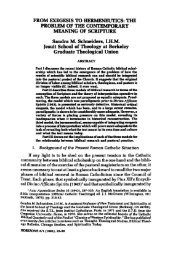WIFE AND SISTER THROUGH THE AGES - Blessed Edmund Rice ...
WIFE AND SISTER THROUGH THE AGES - Blessed Edmund Rice ...
WIFE AND SISTER THROUGH THE AGES - Blessed Edmund Rice ...
Create successful ePaper yourself
Turn your PDF publications into a flip-book with our unique Google optimized e-Paper software.
noSEMEIAthat he can successfully ignore an event that is described, Abram'sconversation with the king.Philo is also guided by his understanding of the relationship of thepresent text (or the events it narrates) to the larger scope of texts of whichit is a part. The Abraham narrative, with the other ancestral stories, arerelated to the legal material coming later as anticipation and exemplification,a relationship that precludes the negative depiction of Abram orSarai in this episode.The second form of control lies in the realistic conventions. Addeddetails must have verisimilitude as possible elements of the event beingdescribed. God's deliverance of Sarai from the king's power is accomplishedthrough "all manner of scarce curable plagues" (Philo: 51), ratherthan the force majeur of a host of angels, in part because of the realisticconvention governing interpretation. The reader must be able to assimilateadditional details on the level of everyday occurrences.The third control resides in the interests of the interpretive communitythat received Philo's work. Philo addressed a particular community ofAlexandrian Jews, a community with particular needs and interests, aneed for moral exhortation and an interest in its own identity, to judge byPhilo's statements. The interest of the community of which Philo was apart shaped his interpretation. Had he failed to incorporate their interests,his interpretation would have been irrelevant. As it is, Philo's interpretationtakes its impetus and its seriousness from the life of his community.This discussion does not exhaust by any means the range of forcesthat influence Philo's interpretation. Additional complexity is hinted at bythe possibility of the interaction of midrashic conventions in Philo'srealistic reading. Other factors doubtless enter in.AUGUSTINE'S LITERAL INTERPRETATIONAugustine's interpretation of the story of Abram and Sarai in Egyptappears in a polemical interchange with the Manichaean Faustus. To alarge extent Faustus sets the terms of the debate and, although we haveonly Augustine's representations of Faustus's positions, it is clear thatFaustus cited the immoralities of Abram and the other ancestors of theJews to discredit the Old Testament. Indeed, Faustus attempted to presentAugustine a conundrum which would force him to abandon the authorityof the Old Testament. Faustus was prepared to grant that the biblicalauthors had libelled Abraham. There were, he allowed, no distressing actsto explain, no sale of Sarai to Pharaoh or Abimelech for Abram's gain. Thebiblical stories were fabrications (Augustine, 1909: 272). If Augustineaccepted this generous proposal, he would not be forced to defend the



